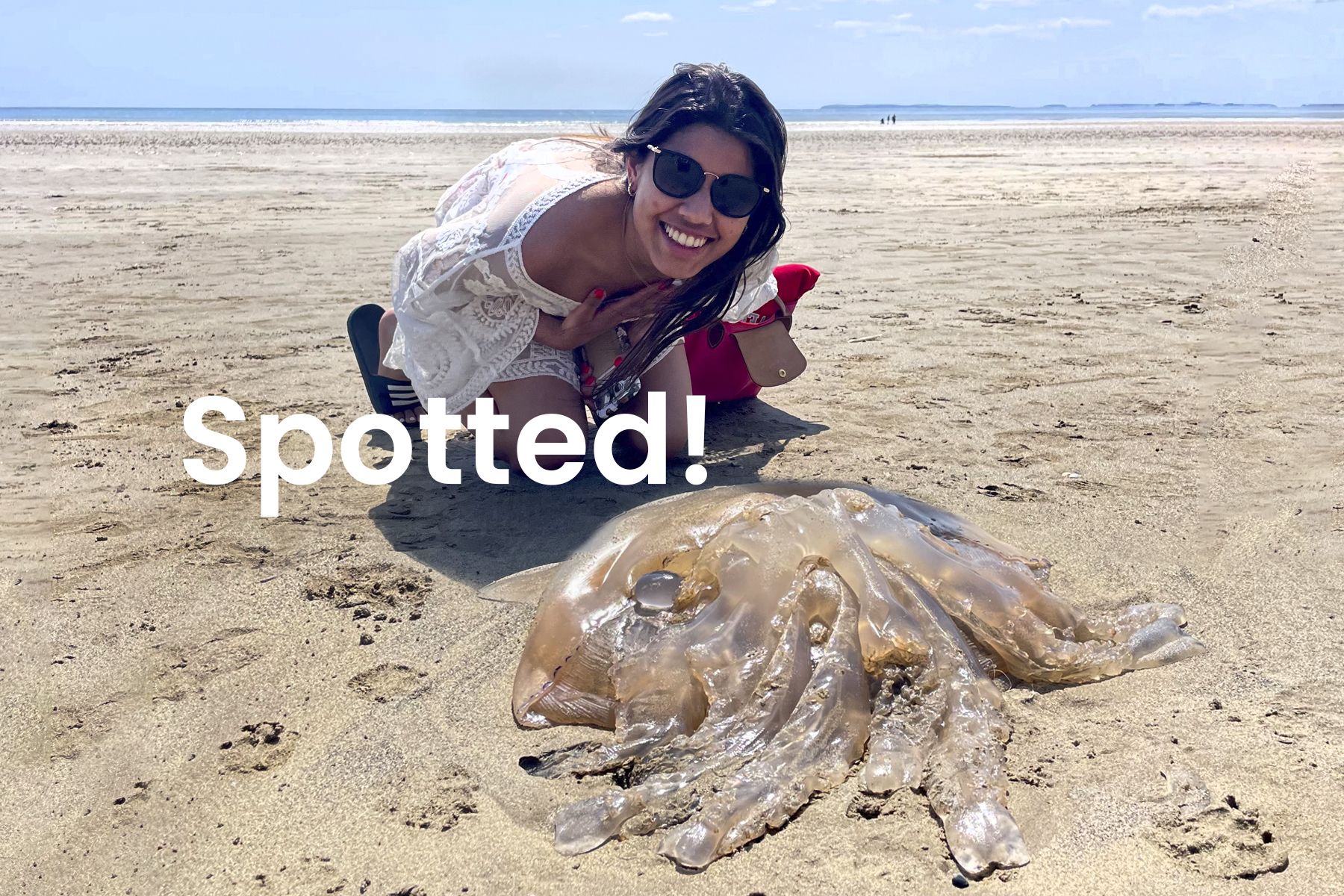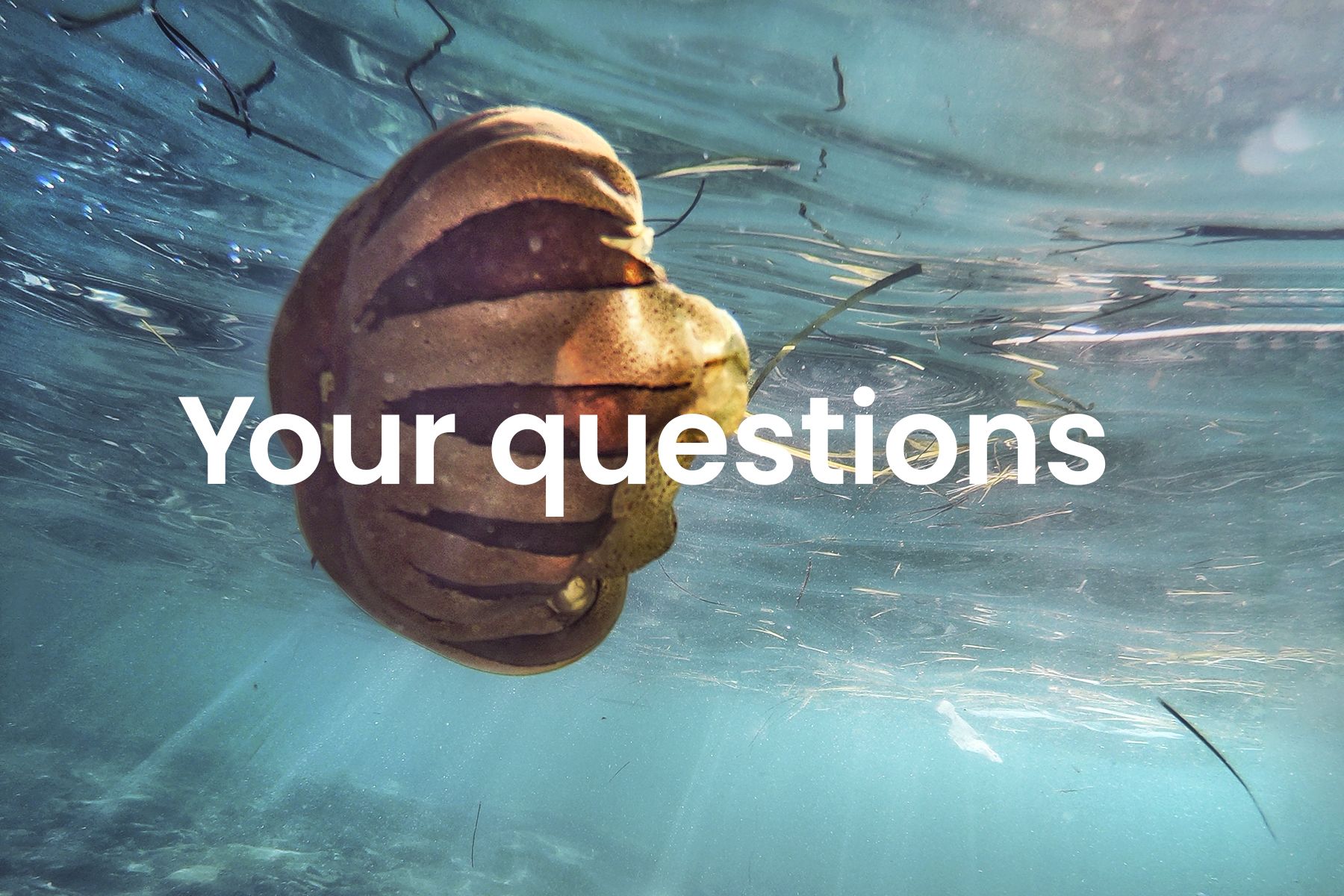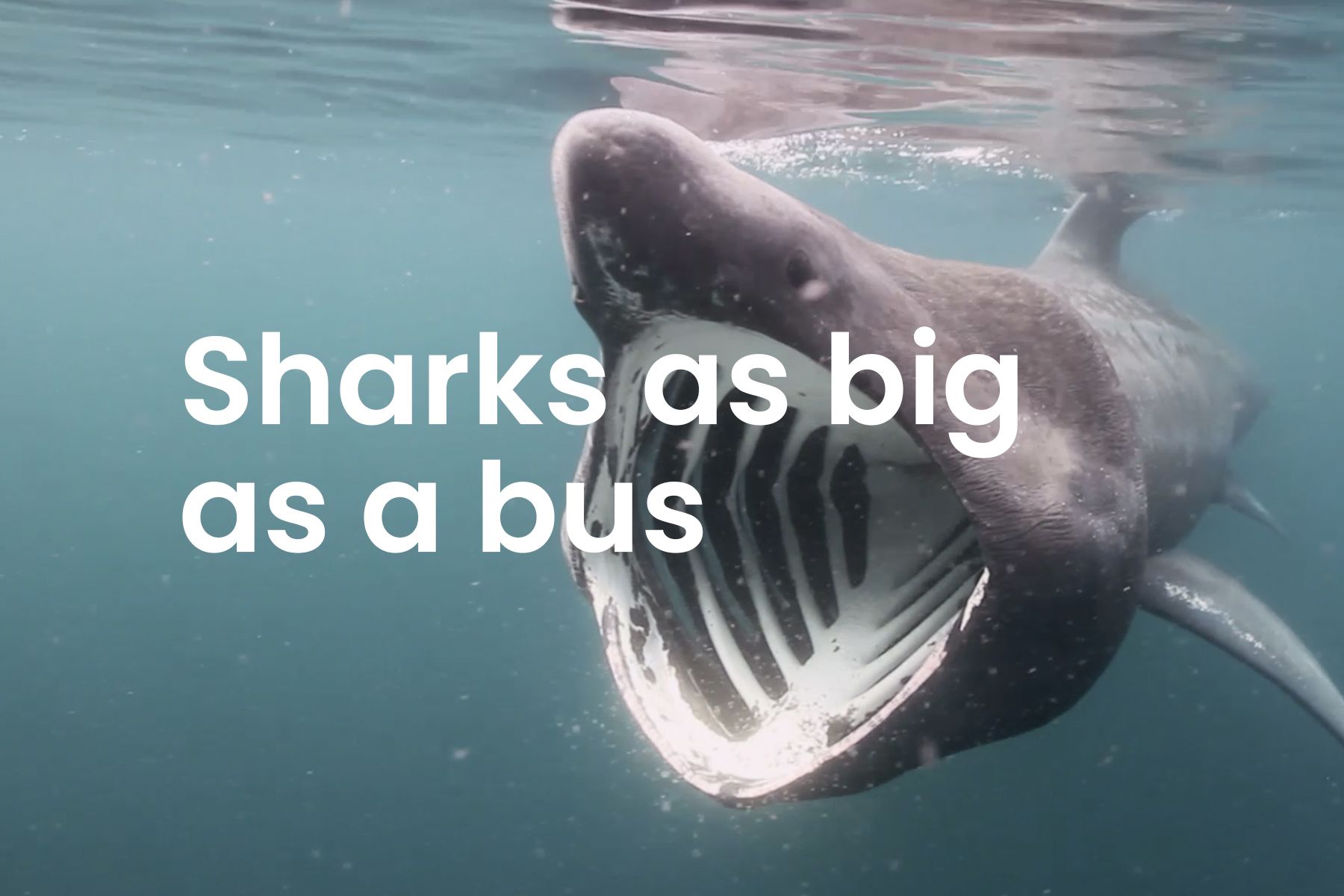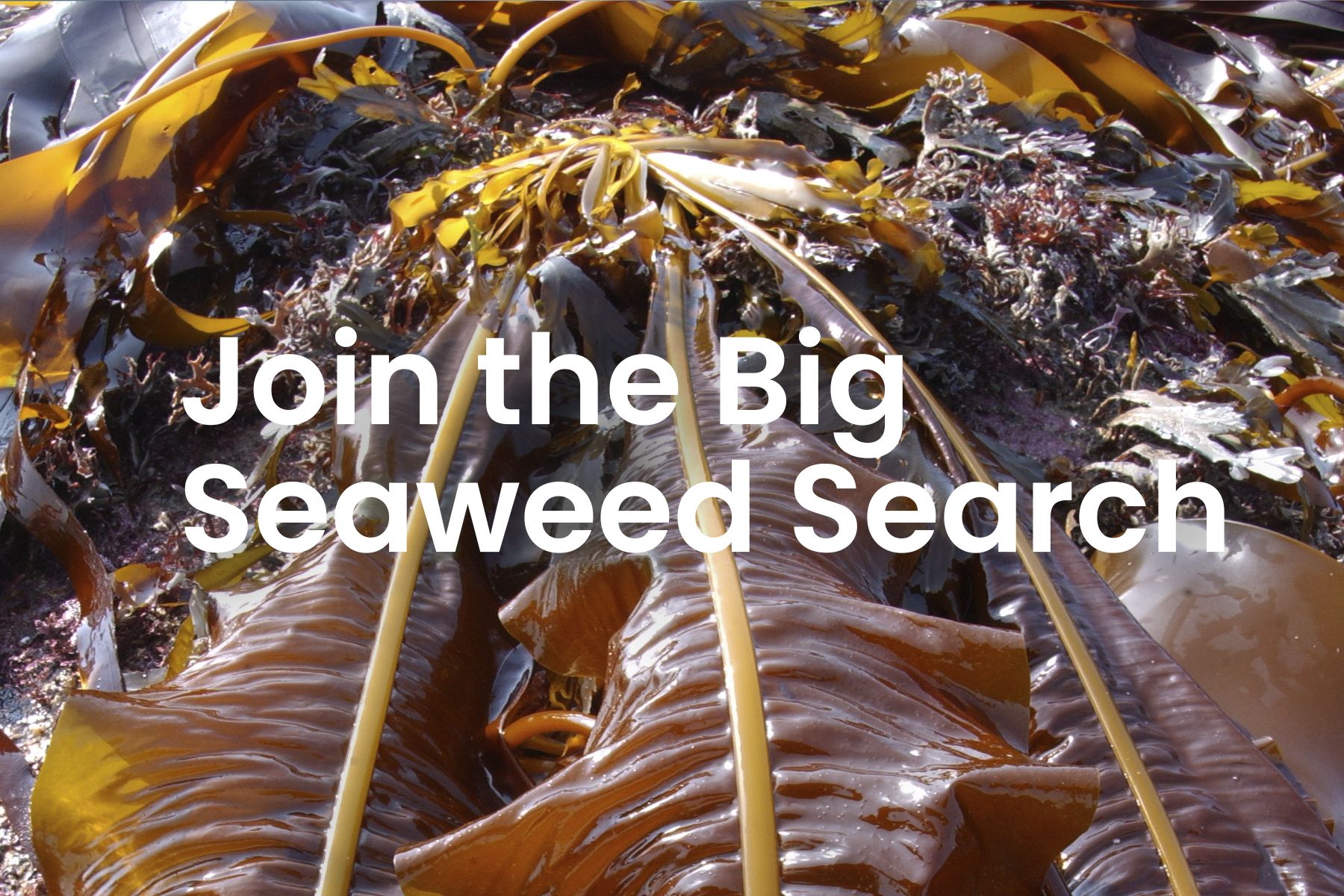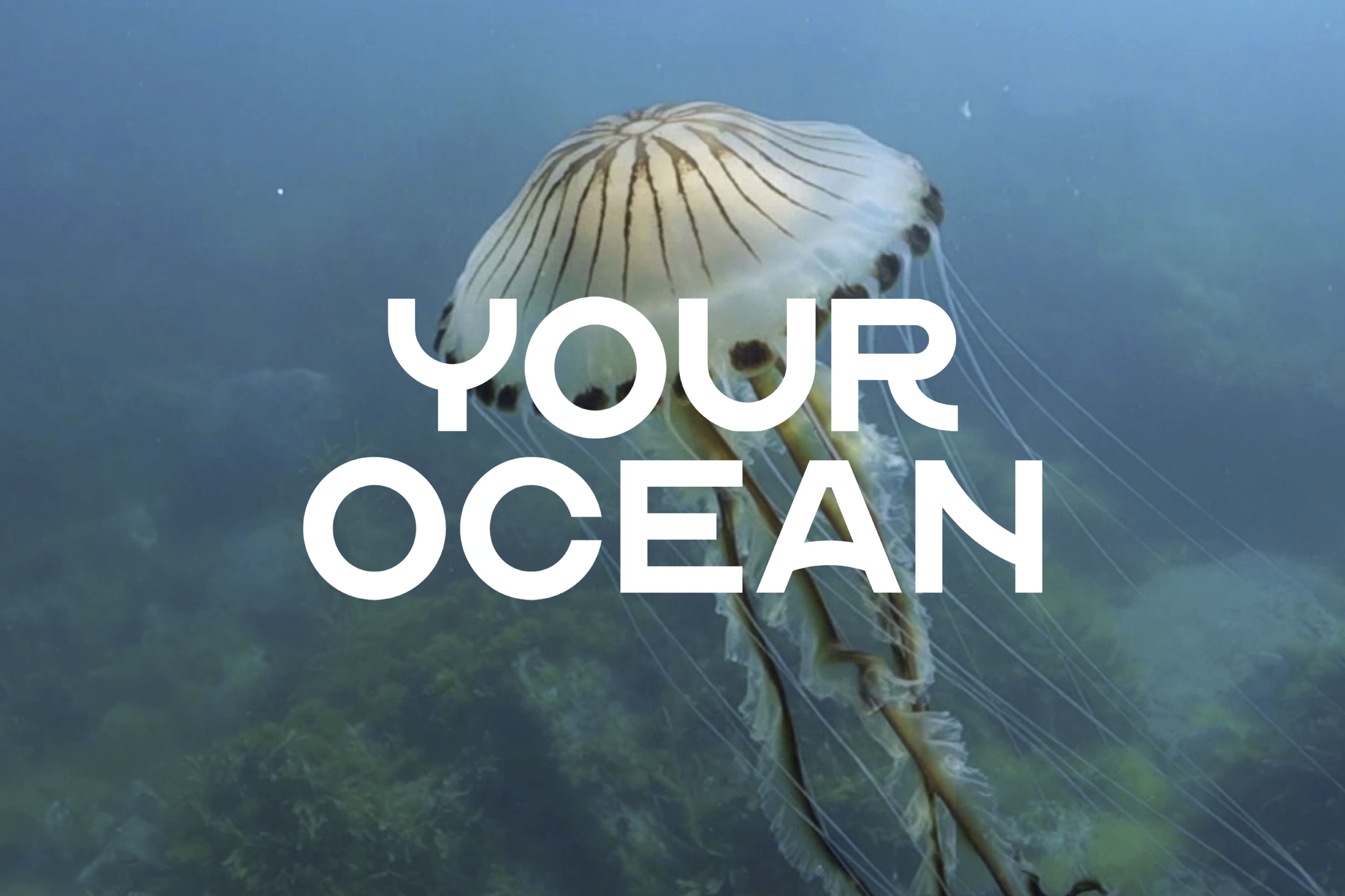
Why are we campaigning to ban disposable vapes?
Youth Ocean Network member Laura Young updates us on her #BanDisposableVapes campaign. Click the video below
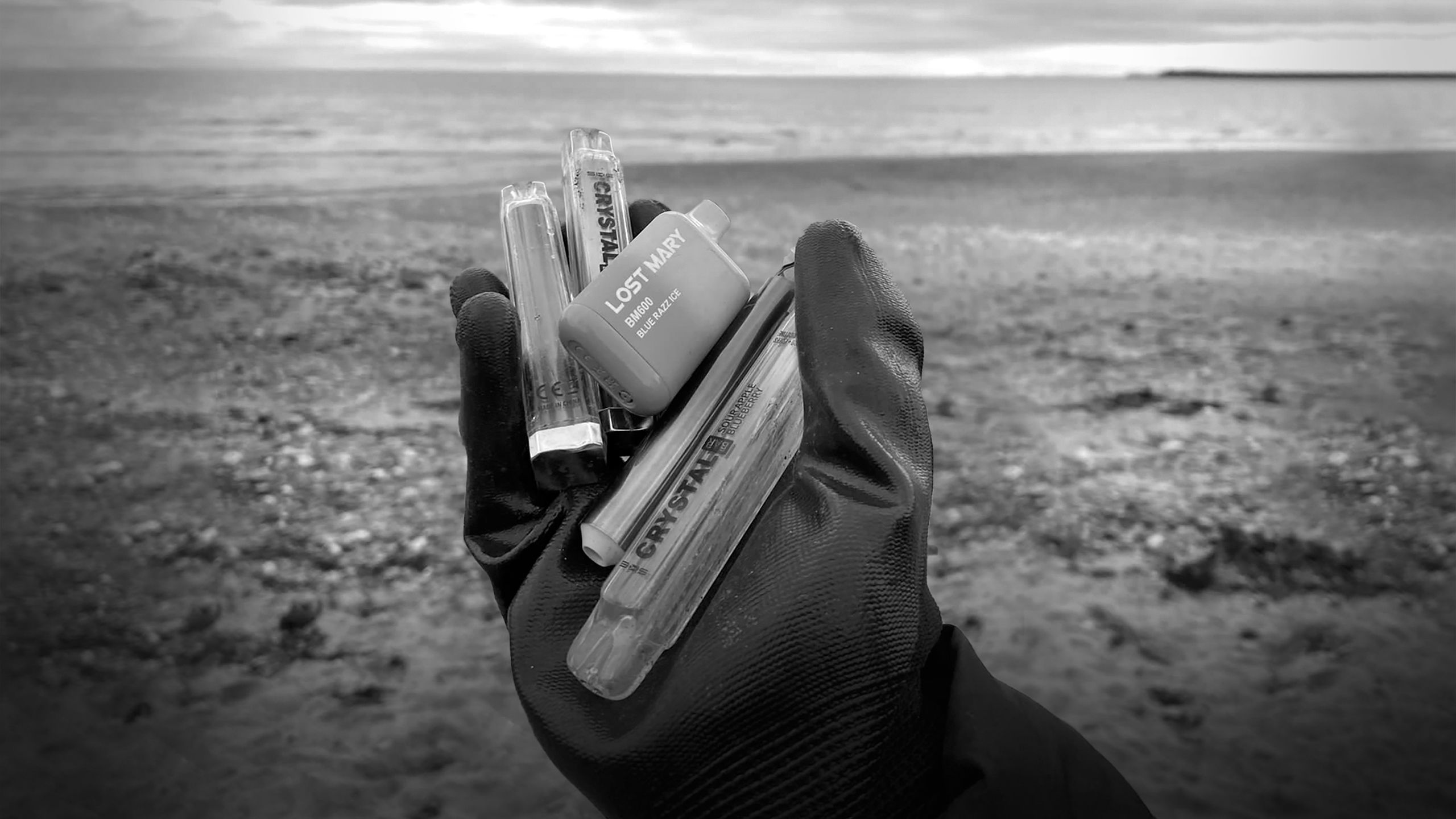

Why are we campaigning to ban disposable vapes?
Youth Ocean Network member Laura Young updates us on her #BanDisposableVapes campaign. Click the video below

We’re supporting Laura Young on her mission to ban disposable vapes that litter our streets, beaches and seas. Anna Turns talks to her about the damage they do and how the campaign is making a big impact
While walking her dog Cooper through the suburbs of Southside in Glasgow last September, Laura Young found a bright yellow and green object on the street. “I’m an avid litter picker, but this was the first time I had ever picked up a disposable vape,” recalls Laura, a climate activist and PhD student. “I knew what it was but had no idea about the ins and outs of it. I just chucked it [in the bin] and didn’t think about what was inside it.”
Vapes are electronic devices that contain lithium-ion batteries. Once strewn across pavements, parks, rivers and beaches, they pose a serious hazard to wildlife, children and dogs. “From that day on, I was finding them everywhere, in all the different colours, flavours and brands – whole, smashed, in parts – and I quickly realised they’re dangerous,” explains Laura, 26, who searched online for ways to protest against this new stream of litter. She found nothing, but felt compelled to act, so she launched her own campaign to #BanDisposableVapes.
Counting the cost
On just one 4 mile walk around the city centre of Dundee, Laura found 55 disposable vapes littering the streets
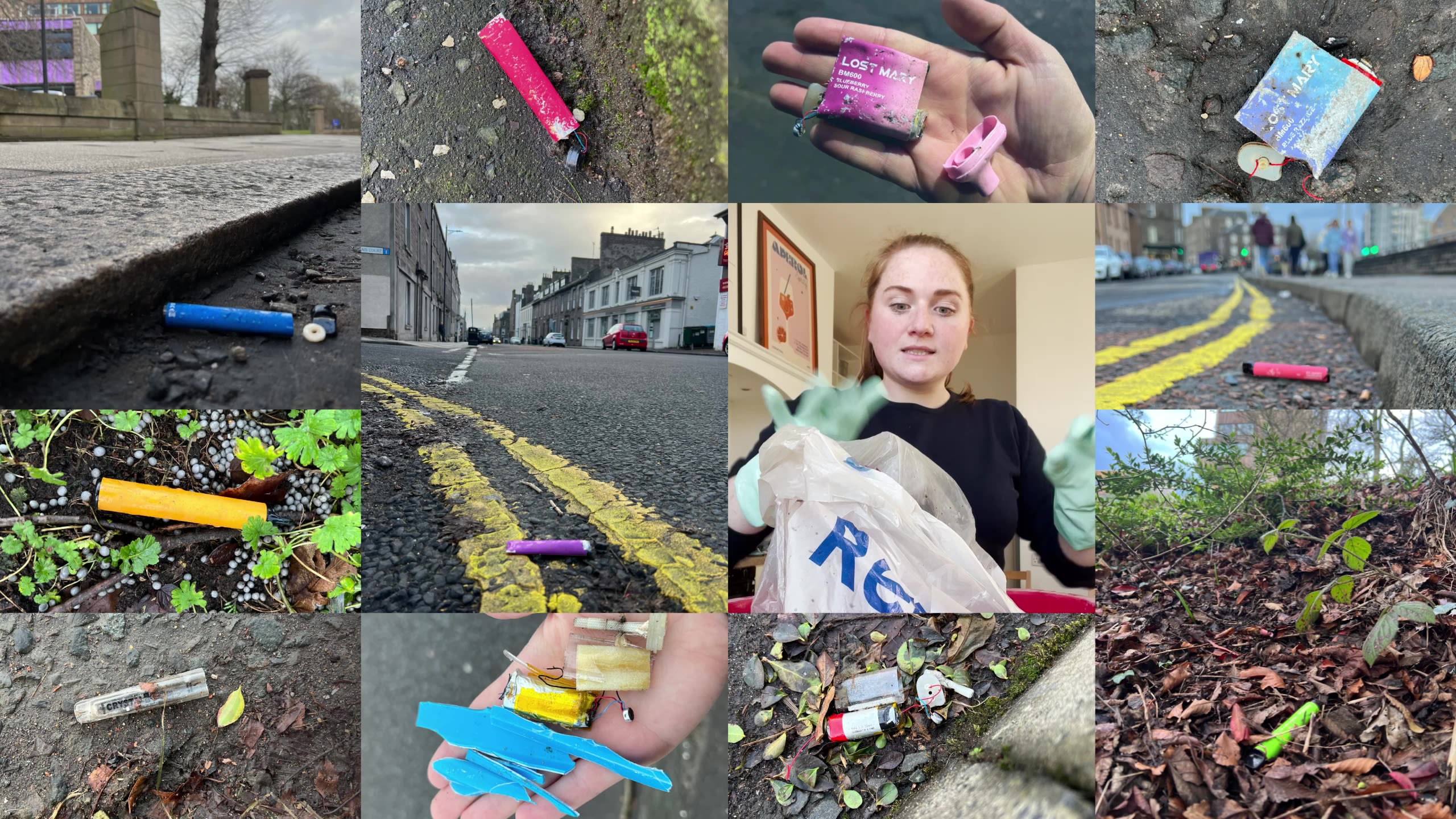
Since joining the Marine Conservation Society in 2018, a year before disposable vapes were first sold here, Laura has regularly taken part in litter picks along the Scottish coast. “I grew up in Glasgow, but I loved every opportunity to go to the beach and have this real appreciation for it,” she says. “Selfishly, I want to enjoy it without being surrounded by litter. I also want to protect it for all that call it home, wildlife included.”
When she arrived at a springtime Marine Conservation Society beach clean near her home in Dundee, she found vapes scattered all over the carpark, right by the sea. “The lithium batteries [inside vapes] are so harmful to marine life,” she explains. “They’re explosive, especially when damaged and wet. When they continually get washed up, they break up into shards of metal with plastic flaking off and lots of risky chemicals.”
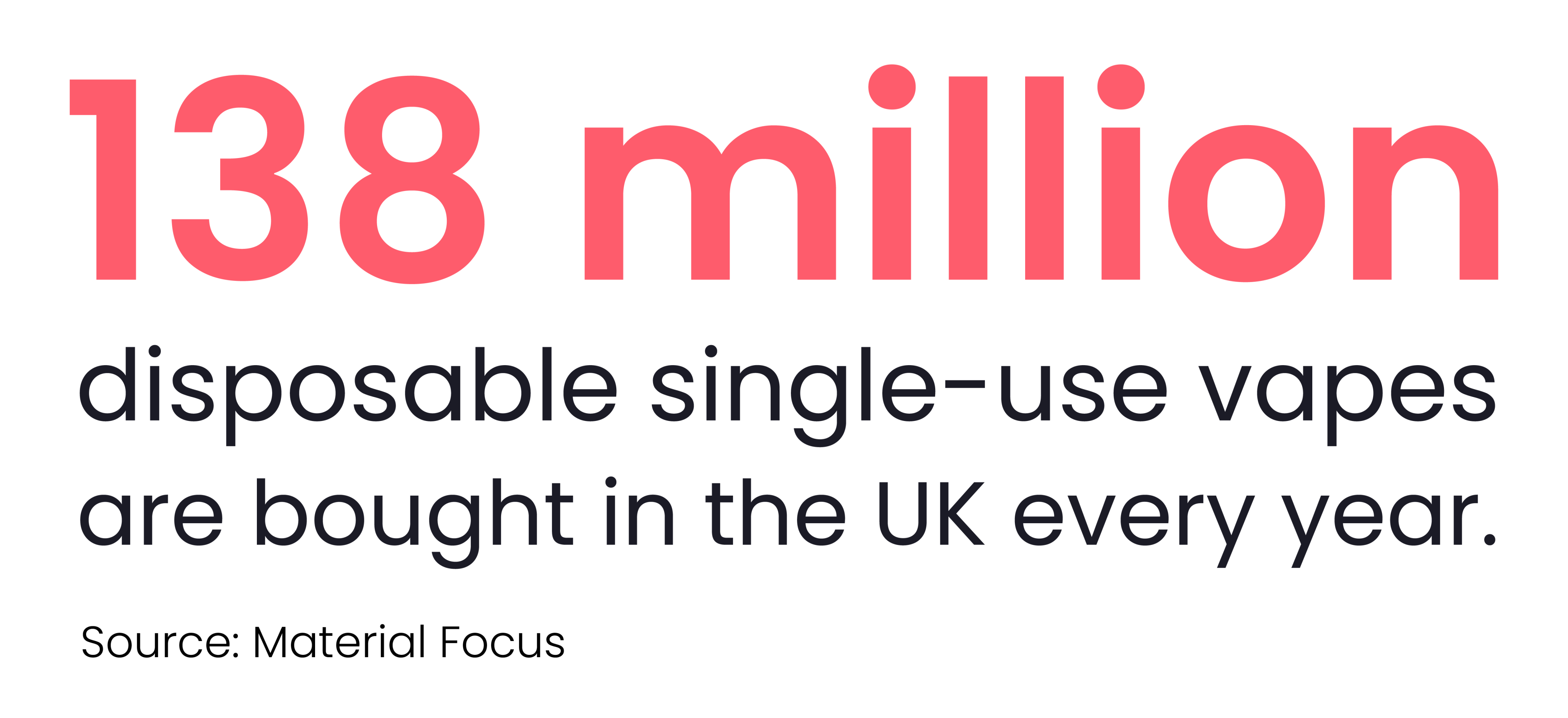
For Laura, it’s “mindboggling” to think that electronics have become such an abundant throwaway item, while more regulations on plastic bags and disposable cutlery come into force. In fact, this problem is so new that vapes aren’t yet listed on the standard Europe-wide form used by beach cleaners to record litter, so Laura currently makes a note of her additional findings at the bottom of the page.
“It’s wild to think that we’re having to create new categories because disposable electronics are being found,” says Laura, who highlights that the Marine Conservation Society now lists vapes on its Source to Sea forms used during inland clean-ups. The charity is also asking for beach clean volunteers to tally the vapes they find on the litter survey form.
People power

As an environmental scientist and an active member of the Marine Conservation Society’s Youth Ocean Network, Laura firmly believes that citizen science plays a major role in gathering evidence of environmental impacts, either at beach cleans or through online campaigns. “The Marine Conservation Society has this real power to influence. Even as a supporter or volunteer, you can be part of something that creates policy change.”
Laura has teamed up with the charity to encourage others to highlight the problem by sharing photos of disposable vapes on social media: “This is more than just tweeting a photo, this gives the campaign ammunition, it shows it’s happening everywhere,” says Laura. So far, over 500 have been counted.
Vapes are having serious unintended environmental consequences, not least because the hidden or ‘zombie’ batteries they contain are a fire hazard. “When these go into our waste streams, quite often in landfills or incinerating plants or recycling plants, the waste gets chopped and shredded before being processed, and it can explode,” she explains.
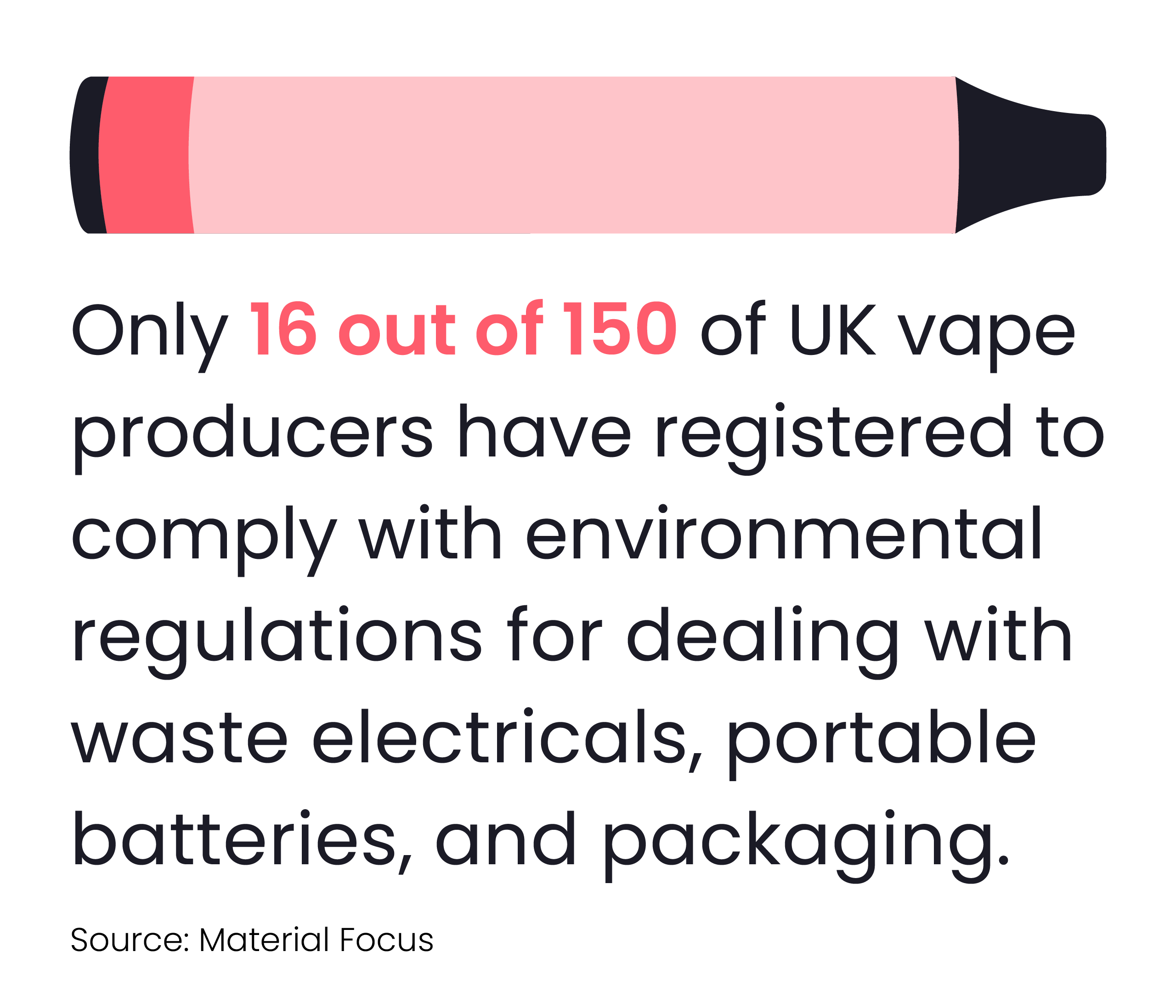
These zombie batteries contain precious metals including lithium and copper – once thrown away, those critical raw materials are lost forever. Yet, the lithium from all the disposable single-use vapes sold in the UK could be enough to make batteries for more than 2,500 electric vehicles, according to Material Focus, a non-profit that runs the Recycle Your Electricals campaign. So, the rise of disposable vapes is the exact opposite of a shift to a more sustainable, circular economy.
Current waste regulations are designed for things like kettles, toasters and washing machines, not items that get binned on a daily or weekly basis, argues Laura. While retailers need to offer take-back schemes specifically for disposable vapes, ultimately recycling won’t solve the problem, she says.
Better education, greater awareness, enforcement of existing waste regulations and transparency that highlights business vape recycling rates are crucial, according to Laura. Most importantly though, the #BanDisposableVapes campaign calls for the manufacture and sale of single-use vapes to be banned.
Tireless campaigner
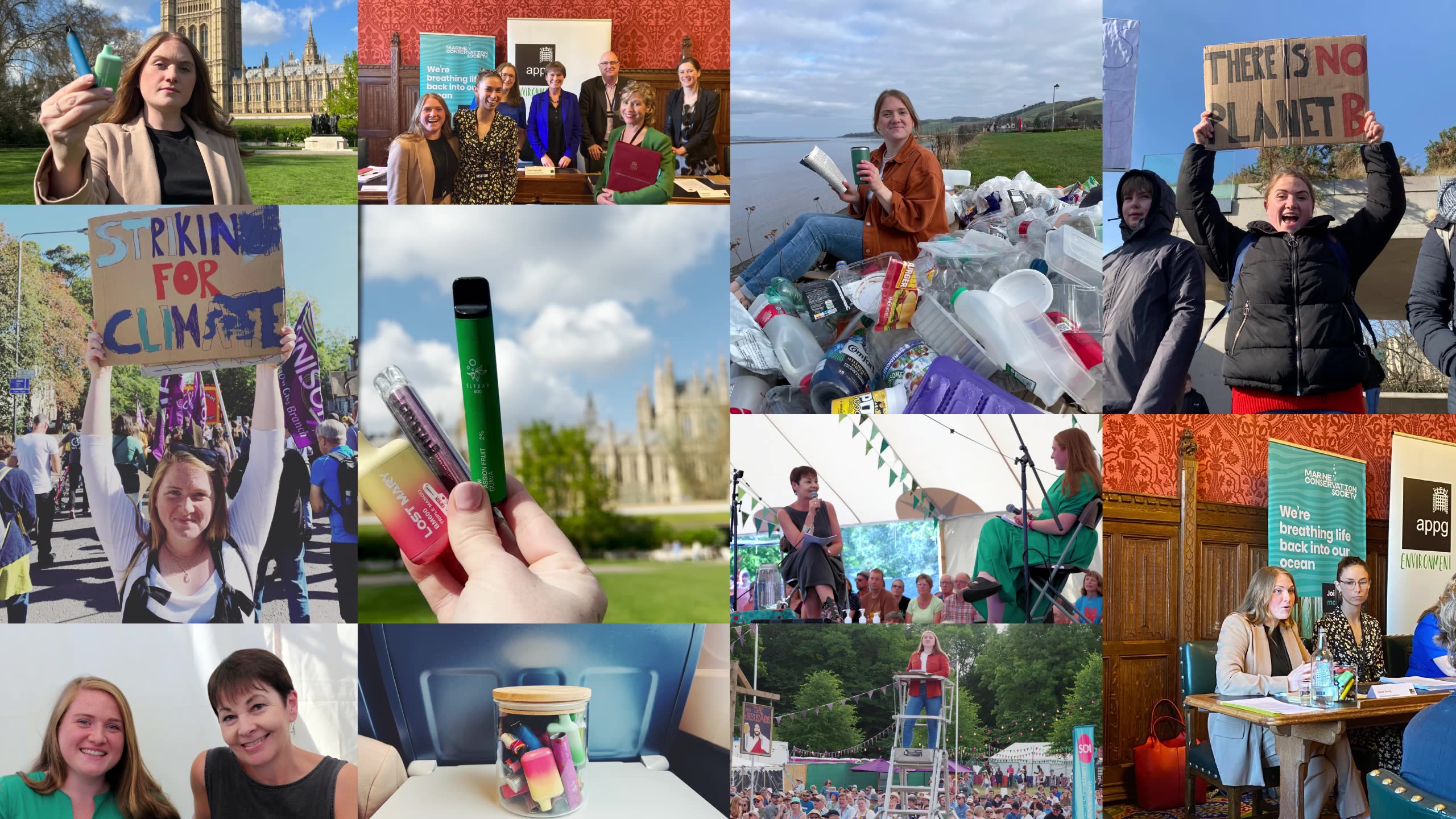
Australia has announced a ban on single-use vapes and Laura wants the UK to follow suit: “We can’t have products that will help a select few people quit smoking if it causes catastrophic damage elsewhere.”
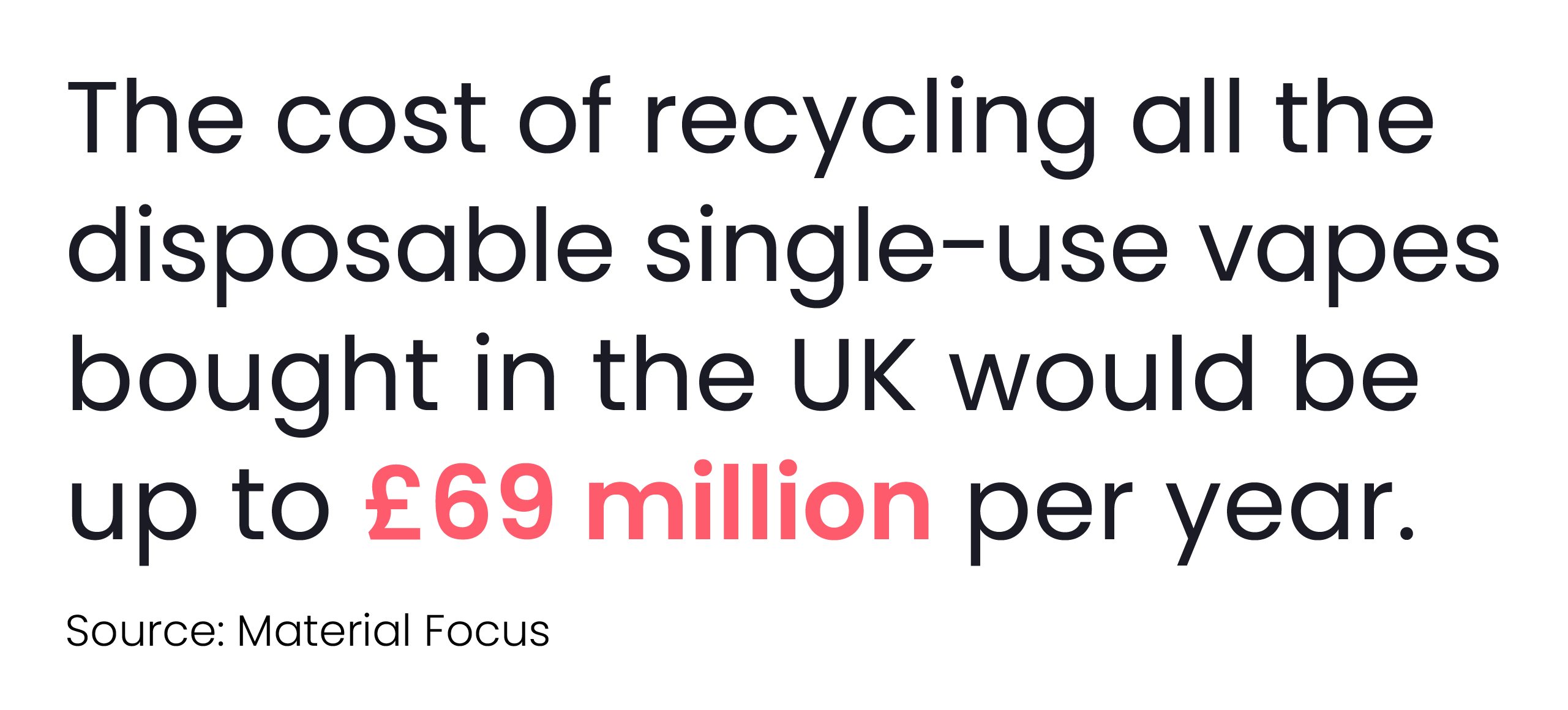
Thanks to Laura’s tireless campaigning, the Scottish Government is considering a ban that’s supported by more than a third of all Scottish councils. “It’s been amazing to see grassroots level change that could really influence the government – they’ve been hearing from schools, litter picking groups, fire services…that’s quite powerful,” says Laura who represented the Marine Conservation Society at an All-Party Parliamentary Group event at Westminster in April to discuss the environmental hazards associated with disposable vapes.
“Original vapes are reusable,” says Laura. “You recharge them, you refill them, so we’ve taken a step in the wrong direction. We’ve gone back in time.” While she’s hopeful about a future ban of disposable vapes, this campaign is just the start for Laura: “We have this opportunity to set a precedent to not let fast electronics enter into our economy or our ocean.”
Take action today

5 ways you can help
1. If you use vapes, consider switching from a single-use to a reusable alternative.
2. Share your pics of vape waste on social media using #BanDisposableVapes and tag @mcsuk on Twitter, @mcs_uk on Instagram and @lesswastelaura
3. Email your MP using Laura’s template at lesswastelaura.com/email-your-mp
4. Talk to your friends, relatives and colleagues about the impacts of fast electronics.
5. Take part in our Source to Sea litter quest by recording the litter (including disposable vapes) you see in your local area. We use the data to track litter back to its source to help stop it getting to the sea.

Stop Ocean Threads
More than 9 trillion plastic microfibres are released each week in the UK from the clothes we wash. These microplastics make their way to UK coastal waters and the wider ocean where they are consumed by all manner of creatures from plankton to basking sharks. The surface of these microplastics holds on to toxins, further increasing the problem. If microfibre filters were fitted in all washing machines, it would help stop the flow of these plastic fibres entering our ocean.
We launched our Stop Ocean Threads campaign back in July 2020, calling on the UK Government to make it law for washing machine manufacturers to include microfibre filters in all new washing machines. In September 2021, we teamed up with Grundig, who introduced a machine with an in-built microfibre filter that prevents up to 90% of plastic fibres from being released into the environment. Across the Channel, France is already taking action, implementing filters into new washing machines by 1st January 2025.
The noise you are making around this topic is also having an effect: Alberto Costa, MP for South Leicestershire, who first raised the issue in Parliament in October 2021, will be giving a second reading of his landmark Microplastic Filters (Washing Machines) Bill in November this year. Please, speak to your MP and urge them to support the second reading of the Bill.
On 7th June, to mark World Ocean Day, we hosted a drop-in session at Westminster with the Women’s Institute to gather support from MPs for action to tackle microplastics.
Scotland’s sewage scandal
Data analysed by our in-house experts showed that sewage polluted Scottish seas for over 113,000 hours in 2022, and all from just 3.4% of Scotland’s sewage overflows. In the same year, our beach clean volunteers recorded over 35,000 pieces of sewage related litter, such as period products and wet wipes on beaches around Scotland.
This pollution is happening near areas of conservation and bathing waters, threatening key habitats, ecosystems and the health of our seas.
We launched our action back in May, calling on the Scottish Government to set progressive reduction targets for sewage spills along with better monitoring and reporting. We asked Scottish residents to email their MSP (Member of Scottish Parliament), urging them to support the implementation of targets and monitoring on sewage spills.
Stop Ocean Poison
From the North to the South Pole and everywhere in between, per- and poly-fluoroalkyl substances (PFAS), otherwise known as ‘forever chemicals’, are polluting the waters of our planet. Our campaign #StopOceanPoison is demanding the UK Government introduce a fit-for-purpose chemical strategy and implement bans on PFAS in avoidable uses. Their use is widespread in everyday items such as non-stick frying pans, water-resistant coats, stain-resistant clothing and even food packaging.
Over 18,000 of you have signed our petition to Stop Ocean Poison and your support is making a difference. ‘Forever chemicals’ are receiving increasing coverage in the media, with more headlines and stories coming out each month.
The Health and Safety Executive and Environment agency published their analysis of the uses and risks of PFAS and suggestions of what should be done to mitigate the risks in their Regulatory Management Options Analysis (RMOA). This was accompanied by a commitment from the UK Government to restrict PFAS in firefighting foam.
Next steps
The RMOA was a good starting point but restrictions from the UK Government need to be quicker and cover more uses of PFAS beyond firefighting foam, in the form of bans on PFAS in avoidable uses. We want to see the upcoming UK Chemicals Strategy address PFAS as a group.

Stop Ocean Threads
More than 9 trillion plastic microfibres are released each week in the UK from the clothes we wash. These microplastics make their way to UK coastal waters and the wider ocean where they are consumed by all manner of creatures from plankton to basking sharks. The surface of these microplastics holds on to toxins, further increasing the problem. If microfibre filters were fitted in all washing machines, it would help stop the flow of these plastic fibres entering our ocean.
We launched our Stop Ocean Threads campaign back in July 2020, calling on the UK Government to make it law for washing machine manufacturers to include microfibre filters in all new washing machines. In September 2021, we teamed up with Grundig, who introduced a machine with an in-built microfibre filter that prevents up to 90% of plastic fibres from being released into the environment. Across the Channel, France is already taking action, implementing filters into new washing machines by 1st January 2025.
The noise you are making around this topic is also having an effect: Alberto Costa, MP for South Leicestershire, who first raised the issue in Parliament in October 2021, will be giving a second reading of his landmark Microplastic Filters (Washing Machines) Bill in November this year. Please, speak to your MP and urge them to support the second reading of the Bill.
On 7th June, to mark World Ocean Day, we hosted a drop-in session at Westminster with the Women’s Institute to gather support from MPs for action to tackle microplastics.
Scotland’s sewage scandal
Data analysed by our in-house experts showed that sewage polluted Scottish seas for over 113,000 hours in 2022, and all from just 3.4% of Scotland’s sewage overflows. In the same year, our beach clean volunteers recorded over 35,000 pieces of sewage related litter, such as period products and wet wipes on beaches around Scotland.
This pollution is happening near areas of conservation and bathing waters, threatening key habitats, ecosystems and the health of our seas.
We launched our action back in May, calling on the Scottish Government to set progressive reduction targets for sewage spills along with better monitoring and reporting.
We asked Scottish residents to email their MSP (Member of Scottish Parliament), urging them to support the implementation of targets and monitoring on sewage spills.
Stop Ocean Poison
From the North to the South Pole and everywhere in between, per- and poly-fluoroalkyl substances (PFAS), otherwise known as ‘forever chemicals’, are polluting the waters of our planet. Our campaign #StopOceanPoison is demanding the UK Government introduce a fit-for-purpose chemical strategy and implement bans on PFAS in avoidable uses.
Their use is widespread in everyday items such as non-stick frying pans, water-resistant coats, stain-resistant clothing and even food packaging.
Over 18,000 of you have signed our petition to Stop Ocean Poison and your support is making a difference. ‘Forever chemicals’ are receiving increasing coverage in the media, with more headlines and stories coming out each month.
The Health and Safety Executive and Environment agency published their analysis of the uses and risks of PFAS and suggestions of what should be done to mitigate the risks in their Regulatory Management Options Analysis (RMOA). This was accompanied by a commitment from the UK Government to restrict PFAS in firefighting foam.
Next steps
The RMOA was a good starting point but restrictions from the UK Government need to be quicker and cover more uses of PFAS beyond firefighting foam, in the form of bans on PFAS in avoidable uses. We want to see the upcoming UK Chemicals Strategy address PFAS as a group.

